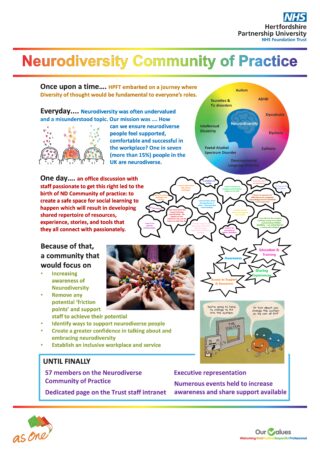This blog is about my experience of creating a Community of Practice at our trust that is helping us to embrace all types of neurodiversity both within our workforce and wider community.
If you are familiar with the term ‘Communities of Practice,’ you may know that it is a very simple concept. Communities of Practice (CoP) are defined by Wenger-Trayner as ‘groups of people who share a concern or a passion for something they do and learn how to do it better as they interact regularly’.
My starting point with CoP began when I became a Q member and discovered Q’s Special Interest Group, convened by Cleo Butterworth. As someone whose experience of improvement has mainly been about exploring collective, co-produced methods of QI, I found this concept intriguing. Curious to know more, I joined the group and took the leadership development programme in setting up a CoP.
As a speech and language therapist by training, my career has centred on facilitating others to overcome psychological and physiological communication barriers in order to live as fully as they can. So when I was approached by one of the team at our trust to consider ways that our organisation could reasonably adjust to meet her neurodiversity needs, I saw an opportunity for improvement, not only for her but for all of us.
I knew that I wanted to develop a way for managers to empower staff with neurodiverse qualities to work at their best. But I wasn’t sure where to begin. Then I remembered a piece of advice from one of my instructors that had stuck. He said, ‘if you don’t know where to go, just start somewhere – maybe small – and go everywhere.’
Key to getting started were the skills and knowledge from the programme I took part in with Q and the Health Innovation Network in developing a CoP. I had listened to many others on the course tell their stories of how they had developed their CoP. This helped me to become more aware of all the CoPs throughout the NHS, and put my own challenges in perspective.
One of the most important elements of setting up a CoP is a willingness to be clear and consistent with your personal and professional boundaries. When I convene a group together, I know that I need to be an inclusive, empathetic leader and bring my real sense of self into the room with me. I do a lot of listening, and, when I need to, I speak up for the collective good of the group. Knowing how to do this has come through regular reflection and observation, which is a key part of the programme.
What is clear is that neurodiverse individuals have much to contribute to health care, and they are best placed to advise on how to reasonably facilitate their needs in the work place.
When encouraged and supported, Communities of Practice generate a collective energy and momentum that powers them to perform at their best.
Our neurodiversity CoP is an ongoing source of learning and insight for our organisation, helping us to drive improvement in targeted areas. They are advising our digital team on which types of digital innovations can help them, in line with our reasonable adjustment policy. They have developed a set of awareness tools that includes a learning programme about the different neurodiversity conditions, a space on our intranet for curated materials and information about neurodiversity, and a monthly event on MS Teams where staff come to share, reflect and ask questions about any aspect of neurodiversity.
Beyond our work force, the neurodiversity CoP also helped the trust to improve community understanding and support. Our CoP welcomes carers and parents of those with neurodiversity, providing them with education, resources and support, as well as a place where they can share and value their lived experience.
My experience of setting up a Community of Practice with our neurodiverse staff members has given us all much more than I was expecting.
Our managers will be better able to support those with neurodiversity within their teams, and create work and social spaces where all of us, regardless of our differences, can be ourselves and be accepted.

Q members can find out more about this area by joining the Communities of Practice Special Interest Group. I found this group to be highly responsive and helpful, and I would encourage you to start with posting a question or observation in the chat.
You can also consider taking the Communities of Practice Leadership Development Programme, which would give you a strong set of skills for starting your own community of practice.